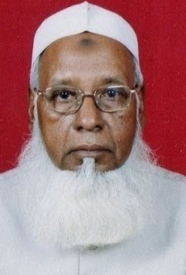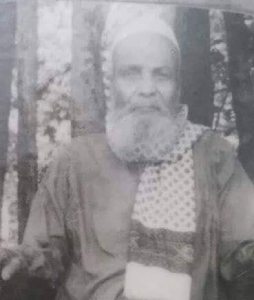Related Research Articles

Purushottam Das Tandon was a freedom fighter from Allahabad,Uttar Pradesh,India. He is widely remembered for his opposition to the partition of India,as well as efforts in achieving the Official Language of India status for Hindi. He was customarily given the title Rajarshi. He was popularly known as UP Gandhi. He was awarded the Bharat Ratna,India's highest civilian award,in 1961.

E. Ahamed,Edappakath Ahamed in full,was an Indian politician from Kannur in northern Kerala. A Member of Parliament between 1991 and 2017,he was a key figure in India's diplomatic relations with the Middle East.

Ram Niwas Mirdha was an Indian politician who served as the 2nd speaker of the Rajasthan Legislative Assembly from 1957 to 1967 and is the longest serving speaker of the Rajasthan Assembly for a period of ten years. He was a cabinet minister of the Government of India for several departments during the 1970s and 1980s and became of member of the Lok Sabha for Barmer,Rajasthan,from 1991 to 1996. He was a member of the executive board of UNESCO from 1993 to 1997. He served as chairman of the Sangeet Natak Akademi until his death from multiple organ failure. He also served as Deputy Chairperson of the Rajya Sabha from 1977 to 1980.
J.M. Haroon Rashid is an Indian politician and former member of the Parliament of India,representing the Theni Lok Sabha constituency. Haaroon Rashid is a leader of Indian National Congress.

Maulana Badruddin Ajmal is an Indian businessman,politician,philanthropist and Islamic theologian from the state of Assam. He is the state-president of Jamiat Ulama-e-Hind for Assam. He was the Member of Parliament,Lok Sabha from Dhubri constituency from 2009 to 2024. In 2024 General elections held in India,he was the wealthiest candidate from Assam with forefront assets exceeding ₹155 crore. He's the Founder and President of the All India United Democratic Front since 2005. He is also Chief Executive Officer of a non-profit organization,Ajmal Foundation which established 25 educational institutions,schools,and hospitals.

A.K.A. Abdul Samad was a prominent Tamil politician,and an important leader of the Indian Union Muslim League. He was also a journalist,editor,author,educationist and businessman. He is popularly known in his native states of Tamil Nadu and Kerala by the title "Siraj-ul-Millat".

M. Muhammad Ismail was an Indian politician and social worker from southern Indian state Tamil Nadu. he was a founder of the Indian Union Muslim League party after the partition of British India. He was popularly known in Tamil Nadu and Kerala as the "Quaid-e-Millat". Ismail was a member of Madras Legislative Assembly and Leader of the Opposition (1946—52). He was also a member (1948—50) of the Constituent Assembly,the drafting body of the constitution of India. He was also a member of Rajya Sabha (1952—58) and Lok Sabha.

Jamiat Ulema-e-Islam Pakistan also known the Jamiat Ulema-e-Islam or simply as Jamiat Ulema-e-Islam (F)(Urdu:جمیعتعلماءِاسلام(ف);lit. 'Assembly of Islamic Clerics (Fazal-ur-Rehman)';abbr.JUI (F) is an Islamic fundamentalist political party in Pakistan. Established as the Jamiat Ulema-e-Islam in 1945,it is the result of a factional split in 1988,F standing for the name of its leader,Fazal-ur-Rehman.

Majlis-e Ahrar-e Islam,also known as Ahrar for short,is a religious Muslim political party in the Indian subcontinent that was formed during the British Raj on 29 December 1929 at Lahore.

Moinul Hoque Choudhury was an Indian politician from Assam. A five-time MLA;he was the Minister of Commerce and Industrial Development during Indira Gandhi regime in 1971. He is also known as the Industrial Reformer of the Barak Valley.
The Difa-e-Pakistan Council is an umbrella coalition of more than 40 Pakistani Political and Religious parties that advocated conservative policies such as closing NATO supply routes to Afghanistan and rejects granting India most-favored nation status.

Mohammad Asrarul Haque was an Indian Muslim scholar and politician,who served as the eighth general secretary of the Jamiat Ulama-e-Hind. He was a member of the Indian Parliament,and represented Kishanganj seat. He was also the state president of Jamiat Ulema-e-Hind.
Roop Nath Singh Yadav was an Indian politician and Member of Parliament of 6th Lok Sabha,belongs to Janata Party representing Pratapgarh Parliamentary Constituency of Uttar Pradesh. He was a veteran freedom fighter who took an active part in the Quit Indian independence movement and was imprisoned.
Satya Prakash Malviya was an Indian politician. He was elected to the Rajya Sabha in 1984 and 1990 from Uttar Pradesh. He served as Minister of Parliamentary Affairs and Minister of Petroleum and Chemicals in Chandra Shekhar cabinet from 1990 to 1991.

Pandit Govind Malaviya was an Indian freedom fighter,educationist and politician.
The All India Azad Muslim Conference,commonly called the Azad Muslim Conference,was an organisation of nationalist Muslims in India. Its purpose was advocacy for composite nationalism and a united India,thus opposing the partition of India as well as its underlying two-nation theory put forward by the pro-separatist All-India Muslim League. The conference included representatives from various political parties and organizations such as Jamiat Ulema-e-Hind,Majlis-e-Ahrar-ul-Islam,All India Momin Conference,All India Shia Political Conference,Khudai Khidmatgar,Krishak Praja Party,Anjuman-i-Watan Baluchistan,All India Muslim Majlis,and Jamiat Ahl-i-Hadis. The Canadian orientalist Wilfred Cantwell Smith felt that the attendees at the Delhi session in 1940 represented the "majority of India's Muslims". The Bombay Chronicle documented on 18 April 1946 that "The attendance at the Nationalist meeting was about five times than the attendance at the League meeting."

Syed Ahmad Hashmi was an Indian Muslim scholar and politician who served as the seventh general secretary of Jamiat Ulama-e-Hind and the chairman of Passenger Amenities Committee. He was a member of the Rajya Sabha,upper house of the Parliament of India representing Uttar Pradesh for two terms.

Ibrahim Ali Chatuli was a Bangladeshi Islamic scholar,politician and social reformer. He was the Education Minister of Assam Legislative Council,and an elected Member of the Assam Legislative Assembly belonging to the Jamiat Ulema-e-Hind political party. His constituency joined the East Bengal Legislative Assembly after the Partition of India in 1947.
Jaleel Ahmad was an Indian Islamic scholar,educator,and politician from Nagina,Bijnor district. He played a key role in establishing religious institutions and promoting education within his community.
Muhammad Daud Ghaznavi,was an Islamic scholar,journalist,teacher,writer and politician in British India and a leader of the Indian independence movement. He served as the president of Punjab Provincial Congress Committee,and co-founded Majlis-e Ahrar-e Islam and the Jamiat Ulema-e-Hind. He was member of Punjab Provincial Assembly.
References
- ↑ "Members of First Lok Sabha". Open Government Data (OGD). Retrieved 11 November 2024.
- ↑ "General Elections, 1951 - The First Lok Sabha". Election Commission of India. Retrieved 11 November 2024.
- 1 2 3 4 5 6 "Parliament Of India Lok Sabha Who S Who 1956". Internet Archive. p. 214.
- ↑ "Who's Who 1950" (PDF). Parliament Digital Library. Retrieved 11 November 2024.
- ↑ India. Parliament. Lok Sabha (1956). Who's who. Parliament Secretariat. p. 174. Retrieved 11 November 2024.